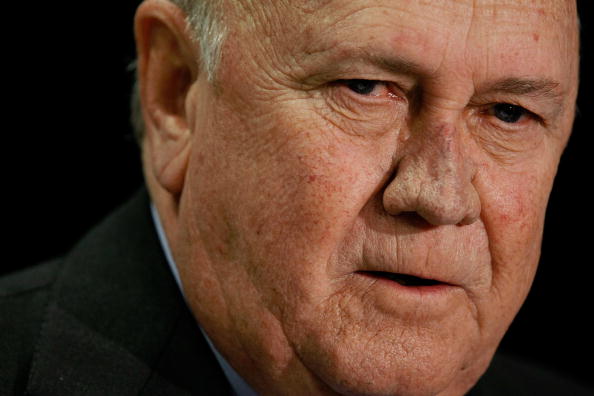Cape Town – South Africa on Sunday paid an official tribute to FW de Klerk, the final president of white rule, who freed Nelson Mandela from prison and steered the country from apartheid to democracy.
De Klerk died on November 11 aged 85 following a battle with cancer. Four days of national mourning were declared in his honour.
He served as president from 1989 to 1994 and is remembered most for leading South Africa’s transition from white-minority rule to the first multi-racial elections in 1994.
ALSO READ | FW de Klerk laid to rest
De Klerk also shared the Nobel Peace Prize with Mandela in 1993 after freeing him from prison in 1990. Mandela then became South Africa’s first black president after his African National Congress party won the 1994 election.
President Cyril Ramaphosa delivered a eulogy at Cape Town’s Protestant Groote Kerk — one of South Africa’s oldest churches — and called De Klerk “brave” for starting the democratic transition in 1990.
President @CyrilRamaphosa arrives at the Groote Kerk in the Cape Town City Centre, Western Cape, for the State Memorial Service of the late former Deputy President Frederik Willem de Klerk. The President will deliver the Eulogy. pic.twitter.com/sOPd4tx134
— Presidency | South Africa ?? (@PresidencyZA) December 12, 2021
“De Klerk went against elements in his own state security apparatus, and against die-hards who were prepared to take up arms to preserve the status quo,” Ramaphosa said.
“He was often misunderstood due to his over-correctness,” De Klerk’s widow Elita Georgiadis told around 200 attendees.
“I shall never forget this man who mesmerised me, who made me want to help him achieve this huge task ahead of him.”
A private mass and the national anthem preceded the ceremony, which featured a portrait of De Klerk between two candles, a choir decorated with white flowers and a performance by Cape Town’s philharmonic orchestra.
Mixed legacy
Despite a positive reputation abroad, De Klerk divided opinion in South Africa and his death prompted mixed reactions.
Critics say he remains inseparable from apartheid-era crimes and could have been held accountable for them had he lived longer.
De Klerk represented the National Party, which in 1948 formally established apartheid’s racial segregation and disenfranchisement of South Africa’s non-white majority.
Ramaphosa acknowledged the lasting sense of injustice felt by many South Africans in his address.
“We can neither ignore, nor must we ever seek to dismiss, the anger, the pain and the disappointment of those who recall the place FW de Klerk occupied in the hierarchy of an oppressive state,” he said.
“We must never forget the injustices of the past.”
ALSO READ | A hero abroad, FW de Klerk’s evasiveness drew ire in South Africa
Outside the church, a small group of protesters held signs saying “Justice denied” and “Justice for apartheid victims” and were swiftly led away by police.
“Ramaphosa shows sympathy for De Klerk, who didn’t answer for the killings, and he has no regard for the victims,” protester Cassiem Khan told AFP.
“Ramaphosa has time for murderers, but he doesn’t have time for the victims of apartheid and the justice that has to be given to them.”
The surrounding area was closed to traffic and placed under high security.
Comments in his final years also tarnished De Klerk’s image amid criticism for his failure to apologise officially for the crimes of apartheid.
In 2020, he denied apartheid was a crime against humanity before retracting the statement and apologising.
De Klerk’s foundation issued a posthumous video apologising “for the pain, hurt, indignity and damage that apartheid has done” to South Africa’s non-white populations.
Follow African Insider on Facebook, Twitter and Instagram
Picture: Getty Images
For more African news, visit Africaninsider.com
Additional reporting by AFP


